Table of Contents
Toxic disaster
- Visakhapatnam: disastrous leak of a toxic chemical that has killed several people and left hundreds sick.
- Horrific stories: people falling from buildings, or into wells and ditches as they lost consciousness.
- Styrene is included in the schedule of the Manufacture, Storage and Import of Hazardous Chemical Rules, 1989.
- The rules lay down strict norms on how it should be handled and stored.
- Was the reopening work at the factory left to unskilled people, as some city officials have said?
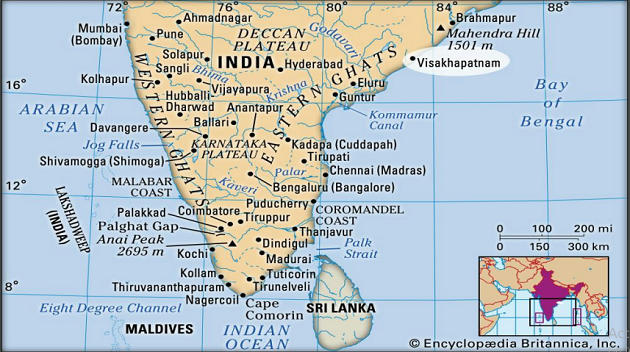
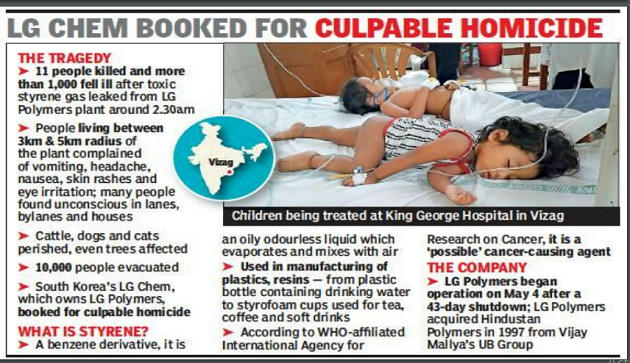
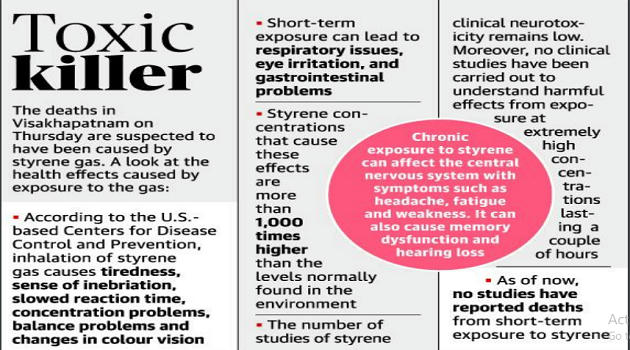
- Victims and families should get, solatium payment and highest quality of health care.
- What happened in Gopalapatnam is also a warning for industries across India.
- Safety of industrial chemicals requires continuous watch.
- Transparent oversight advances sustainable development by eliminating terrible mistakes.
- A gas leak at a paper mill in Chhattisgarh and a boiler explosion at a Neyveli Lignite Corporation plant leading to injuries among workers were also reported yesterday.
Slow, but steady
- 6|May|2020: 52,469 confirmed cases and 1,771 fatalities
- India entered the list of the top 15 countries with the highest number of people infected by the novel coronavirus.
- Worryingly for India, cases have continued to double every 10 days.
- USA: more than 1.2 million cases i.e. 32.7% of world total
- Italy, Spain, the U.K., France, Germany, Turkey and Iran finally seem to be experiencing a relative slowdown in the growth of new cases.
- Brazil and Russia have shown no flattening of the curve as cases continue to exponentially increase in these countries.
- India: lockdown might have been necessary but it is not sufficient.
- Mantra: early contact tracing and testing during the outbreak.
- South Korea: community testing and surveillance
- Maharashtra + Gujarat: tested more samples per day than the national average.
- WB + MP: lower than the national average
Conducting elections during a pandemic
- Article 164(4) in The Constitution Of India 1949: A Minister who for any period of six consecutive months is not a member of the Legislature of the State shall at the expiration of that period cease to be a Minister.
- Mr. Thackeray, who took oath as Chief Minister on November 28, 2019, has to become a member of the legislature within six months, which ends on May 27.
- Elections were going to take place on 26|March|2020
- EC postponed it indefinitely by using its powers under Article 324 of the Constitution, along with Section 153 of the Representation of the People Act, 1951.
- Supreme Court, in S.R. Chaudhuri v. State of Punjab and Ors (August 17, 2001).
- Mr. Thackeray was left to take the nomination route.
- In pursuance of this, the Cabinet, headed by Deputy Chief Minister Ajit Pawar, submitted a proposal to the Governor to nominate Mr. Thackeray to the Legislative Council. Article 171(3)(e) coupled with Article 171(5) empowers the Governor to nominate an individual with “special knowledge or practical experience”.
- The Governor, however, put the proposal in limbo for over a fortnight.
- The Prime Minister’s intervention and the EC’s prompt action averted the political impasse — polls to nine legislative council seats in Maharashtra will now be held on May 21.
- 288 members of the Vidhan Sabha will be voting in this election.
- But a bigger cause for concern for the EC are the upcoming Assembly elections for Bihar (which must be concluded by November 29, 2020), West Bengal (May 30, 2021), Assam (May 31, 2021), Kerala (June 1, 2021), Tamil Nadu (May 24, 2021) and Puducherry (June 8, 2021).
- Unlike the Rajya Sabha/Legislative Council elections which can be postponed indefinitely, the EC can postpone elections to the Lok Sabha and State Legislative Assemblies for a period of only six months, the constitutionally defined limit between two sessions of the House/Assembly (Article 85(1) and Article 174(1) of the Constitution, respectively).
- For a further period of extension, the ball is in the executive’s court, which will be faced with two possibilities.
- The first is proviso to Article 172(1) whereby during a state of Emergency, an election can be postponed for one year in addition to a period of six months after Emergency is lifted.
- The rider, however, is that a state of Emergency can be declared only if there is a threat to the security and sovereignty of the nation, not if there is an epidemic or a pandemic.
- The second option is to declare President’s rule in the State, enabled by Article 356(1) of the Constitution.
- But its limits have been repeatedly defined by the Supreme Court.
- Some experts say that the COVID-19 pandemic could last for 2 years.
- South Korea disinfected polling centres, and mandated that voters practise physical distancing, wear gloves and masks and use hand sanitiser.
- Voters had their temperatures checked on arrival at the booths.
- Those who had a temperature above 99.5 degrees Fahrenheit were sent to booths in secluded areas.
- The interests of infected voters and the interests of those suspected of having the virus were not ignored: COVID-19-positive voters were allowed to mail their ballots, while self-quarantined voters were allowed to vote after 6 p.m.
- The EC could adopt targeted measures for older voters who are more vulnerable to COVID-19. Options like proxy voting under a wellestablished legal framework, postal voting, and mobile ballot boxes can be explored.
- The EC has a difficult task of sticking to its goal of ‘No Voter Left Behind’ while also ensuring that the elections do not turn into a public health nightmare.
Water wisdom during a pandemic
- 22 March: World Water Day
- Water is a common pool natural resource.
- Broader aim: to raise awareness on the importance of freshwater and advocate for its sustainable management.
- Covid-19: importance of water in handwashing and personal hygiene practices
- The choice of theme for the event this year, “Water and Climate Change” reflected the desire of policymakers to address the impact of climate change on the water sector.
- Climate change and water are inextricably linked.
- A warmer climate causes more water to evaporate from both land and oceans; in turn, a warmer atmosphere can hold more water, roughly 4% more water for every 1ºF rise in temperature.
- These changes are expected to lead to negative consequences in the water sector, with increased precipitation and run-off (flooding) in certain areas and less precipitation and longer and more severe scarcity of water (droughts) in other areas.
- Wet areas are expected to become wetter and dry areas drier.
- This influences almost all aspects of the economy including drinking water, sanitation, health, food production, energy generation, industrial manufacturing, and environmental sustainability and ultimately the achievement of the Sustainable Development Goals (SDGs).
- India has come up with climate change adaptation and mitigation strategies and appropriate policy measures.
- The government is implementing the ‘National Action Plan on Climate Change’ through eight National Missions, including the Water Mission.
- However, effective policies need the support of the local governments, corporates and NGOs.
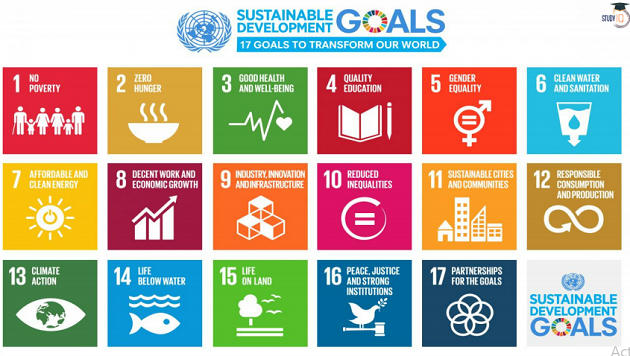
- As tanks and ponds can store and recharge the excess rainwater to the aquifer, their rejuvenation (desilting) facilitates flood and drought management.
- We need to revisit our rich tradition and culture of water wisdom in water resources management.
- More public awareness on the need for climate-resilient actions, including protecting carbon sinks like oceans, wetlands, peatlands, and mangroves, adopting climate-smart agricultural techniques, rainwater harvesting, waste-water reuse, and judicious use of water, should be generated and inculcated in each citizen.
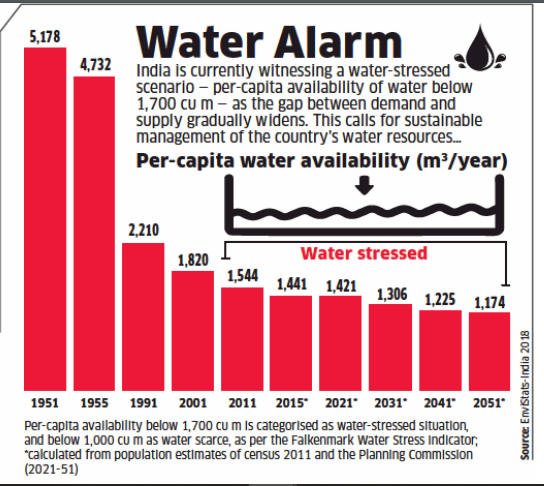
NEWS
- India registers 3,561 new cases, 89 deaths in a day
- SBI cuts lending rate, FD interest
- State Bank of India, the country’s largest lender, has reduced the marginal cost of funds based lending rate (MCLR) by 15 basis points across all tenures.
- With this, the one-year MCLR would be 7.25%, with effect from May 10. “Consequently, equated monthly instalments on eligible home loan accounts (linked to MCLR) will get cheaper by approximately ₹255 for a 30-year loan of ₹25 lakh,” SBI said in a statement.
- The lender also cut the retail fixed deposit rate by 20 bps for up to three years maturity, citing adequate liquidity, effective May 12.
- The SBI also introduced a new deposit product for senior citizens.
- PETA flags tuberculosis in captive elephants
- With tuberculosis (TB) prevalent among captive elephants, People for the Ethical Treatment of Animals (PETA) has demanded festival organisers go for elephant-free celebrations.
- It notes that many captive elephants in Kerala are suffering from TB, which is highly contagious and transmissible not only between elephants but also from elephants to human beings.
- ‘Vande Bharat Mission’ begins, first batch of evacuees arrives
- Two flights from the Gulf carrying 363 passengers touching down at the Cochin and Karipur airports.
- ‘India taking all possible steps’
- Prime Minister Narendra Modi on Thursday said India was taking all possible steps to save lives during the COVID-19 pandemic as well as responding to calls for help from other countries.
- Mr. Modi was delivering the keynote address during a virtual Buddha Purnima celebration organised by the Culture Ministry and the International Buddhist Confederation.
- ‘Naikoo was under the radar for six months’
- IMD includes PoK in weather forecasts
- The India Meteorological Department’s Regional Meteorological Centre has started including cities in Pakistan-occupied Kashmir (PoK) in its forecasts, a departure from its previous format, officials said on Thursday.
- The IMD has started including Gilgit-Baltistan and Muzaffarabad, which are parts of PoK, under the Jammu and Kashmir meteorological sub-division since May 5, said Kuldeep Srivastava, the head of the Regional Meteorological Department that gives forecast for the northwest meteorological division of the IMD.
- 4 States want U.P. labourers to stay
- $40 charge for sea evacuation by Navy
- U.S. pat for India’s role in Afghanistan
- The U.S. recognises India’s “constructive contribution” to Afghanistan, said U.S. Special Representative for Afghanistan reconciliation Zalmay Khalilzad, who came to Delhi on Thursday and met with External Affairs Minister S. Jaishankar and National Security Adviser Ajit Doval to brief them on progress in the peace process that has faltered in the past few weeks.
Download Free PDF – Daily Hindu Editorial Analysis






















 WhatsApp
WhatsApp